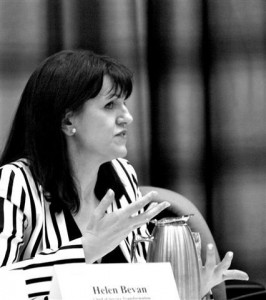Helen Bevan (@HelenBevan on Twitter) works with NHS Improving Quality, the national improvement team for the NHS in England.
I will be writing a regular blog for the BMJ Quality Blog. So this is my introductory blog about my work passions which give some hints about what I might write about in future blogs. I should also tell you a little bit about my background, as I don’t think you can separate the blog from the person.
I’ve worked in quality improvement in the English National Health Service for more than two decades. I’ve learnt so much first-hand about delivering change, mostly because large scale change rarely ever goes to plan. I also had a “pre-NHS” career, although it feels a long time ago now. My first degree was in social science. I am a very good advertisement for the benefits and relevance of a social science education; I still use many of the ideas and principles about large scale change that I learnt as a teenage undergraduate. In my 20s, I worked in organisational and leadership roles in local government and education. My roles were always about leading change, helping people think differently and building new skills; I worked on one of the earliest “Total Quality Management” projects in the education sector in the late 1980s. I joined the NHS in 1991 as part of a scheme to bring senior leaders from other industries into the health sector. My change management skills were identified very quickly by the NHS and since then, my entire NHS career has been about enabling big change to happen. I’ve undertaken all my subsequent education, up to doctoral level, part time whilst leading major change programmes. It isn’t something I’d recommend to the fainthearted.
I spent much of the 1990s leading The Leicester Royal Infirmary “re-engineering programme”; a massive effort to transform an NHS hospital on a scale never attempted before. Not everything we tried worked but much did and that experience was seminal for me as a leader of change. It taught me greatly about the importance of big ambition for service change and for patients. Terry McNulty and Ewan Ferlie wrote a book about it which remains one of the most informative texts on healthcare improvement ever written. If, as a country, we had followed McNulty and Ferlie’s advice on how to go about change in a clinical environment, we would be significantly more advanced in our change efforts today.
In 1998, I was given my first NHS-wide job in improvement, working with policy makers, clinicians and hospital managers from across England to eliminate waiting times for patients. And in 2013, I’m still working at a national level in the NHS, supporting quality improvement. I’d say that my biggest achievement has been helping to make improvement mainstream in the NHS, hopefully in a way that had an impact on a lot of front line clinical teams and patients. When I first started life as a healthcare improver it was a lonely occupation, undertaken by only a few enthusiasts and visionaries. Now, the systematic application of quality improvement methods happens in most NHS organisations to some degree. I think that I have helped along the way through very practical but effective strategies such as the Ten High Impact Changes for Service Improvement and Delivery, The Productive series including The Productive Ward and Productive General Practice, the use of social movement principles in healthcare improvement and more recently, the NHS Change Model. These initiatives have spread to healthcare systems around the world. I have stuck with my role at a national level in the NHS for many years and I believe the continuity has helped.
It’s obvious to me that the current era offers the best potential ever for large scale change in healthcare. The challenges that the NHS and other healthcare systems face now mean that many of the previous incremental ways of undertaking change aren’t fast enough or broad enough for the future. We need to build on the strengths that we have as an NHS system but bring in fresh perspectives. We have to design change strategies with a “second order” mindset (possibilities, connections and innovative solutions at scale) rather than “first order” thinking (limits losses and fears, doing more of what is done already, on a bigger scale). But more of this in coming weeks.
Over the years, I have trained in many different methodologies and philosophies for quality improvement and organisational development; from Lean and Six Sigma to the Model for Improvement to Polarity Management and large group engagement to McKinsey’s five frames for organisational health and transformation to community organising and social movement thinking. I have huge respect and appreciation of all these approaches and utilise them all but I’m not a purist about any one approach. I think that the skilled improvement leader has a toolkit of approaches that can be utilised to any given situation.
And no, I’m not a direct descendent of Aneurin Bevan, although I’m proud that I share my surname with the founder of the NHS. My paternal ancestors (“the Bevans”) were seafarers and sailmakers from Bristol. At some point, centuries ago, they crossed the Bristol Channel from South Wales. My greatest NHS inspiration is my mother, Beryl Bevan who worked as an NHS domestic assistant for nearly 30 years. My mum lived out her NHS values in her job, through her hard work, her kindness and positive attitude. She epitomises thousands of NHS workers in the extent to which she was willing to help others and do far more than she was employed to do. I aspire to be like her every day in the way that I do my NHS role.
I hope this has whetted your appetite for my blog and look forward to many great comments and conversations in coming weeks.
